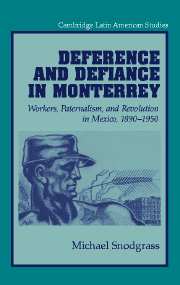Book contents
- Frontmatter
- Contents
- Acknowledgments
- Introduction
- 1 Porfirian Progress in “Mexico's Chicago”
- 2 Revolution Comes to Monterrey
- 3 Work, Gender, and Paternalism at the Cuauhtémoc Brewery
- 4 Making Steel and Forging Men at the Fundidora
- 5 The Democratic Principles of Our Revolution: Labor Movements and Labor Law in the 1920s
- 6 Every Class Has Its Leaders: ASARCO, The Great Depression, and Popular Protest in Monterrey
- 7 Stay with the Company or Go with the Reds
- 8 State Your Position!: Conservatives, Communists, and Cardenismo
- 9 The Quotas of Power: Organized Labor and the Politics of Consensus
- 10 The Persistence of Paternalism
- 11 The Institutionalized Revolution
- Select Bibliography of Primary Sources
- Index
5 - The Democratic Principles of Our Revolution: Labor Movements and Labor Law in the 1920s
Published online by Cambridge University Press: 19 August 2009
- Frontmatter
- Contents
- Acknowledgments
- Introduction
- 1 Porfirian Progress in “Mexico's Chicago”
- 2 Revolution Comes to Monterrey
- 3 Work, Gender, and Paternalism at the Cuauhtémoc Brewery
- 4 Making Steel and Forging Men at the Fundidora
- 5 The Democratic Principles of Our Revolution: Labor Movements and Labor Law in the 1920s
- 6 Every Class Has Its Leaders: ASARCO, The Great Depression, and Popular Protest in Monterrey
- 7 Stay with the Company or Go with the Reds
- 8 State Your Position!: Conservatives, Communists, and Cardenismo
- 9 The Quotas of Power: Organized Labor and the Politics of Consensus
- 10 The Persistence of Paternalism
- 11 The Institutionalized Revolution
- Select Bibliography of Primary Sources
- Index
Summary
Historians of industrial paternalism long focused attention upon the places where the system achieved its greatest results: the semirural textile mill villages and the isolated company towns of the industrializing world, places where employers enjoyed a greater capacity than urban industrialists to regulate their workers' lives. As Patrick Joyce concludes in his seminal study of British labor, “What made paternalism so effective was the employer's capacity for defining and thus delimiting the social outlook of the workforce.” The traditional view of southern (U.S.) mill villages held that the beneficiaries of paternalism remained shielded from the world of organized labor and the political cultures upon which unionism rested. When labor organizers did arrive, local elites could mobilize antiunion resistance by portraying unionists as outsiders intent upon unraveling the social fabric that wove the lives of workers and managers together. Workers in company towns, of course, fashioned countless means of negotiating their loyalties with paternalistic employers. And paternalism itself could foster working-class solidarities that bolstered militant struggles for union recognition. Consistent with the Monterrey case, scholars have also compared how welfare capitalism's scope and reception may differ in an urban environment. While many urban workers lived in relatively insulated innercity communities dominated by a single employer, they were nonetheless exposed to political cultures and organized labor movements that challenged the paternalistic pretension of their employers.
- Type
- Chapter
- Information
- Deference and Defiance in MonterreyWorkers, Paternalism, and Revolution in Mexico, 1890–1950, pp. 107 - 144Publisher: Cambridge University PressPrint publication year: 2003



